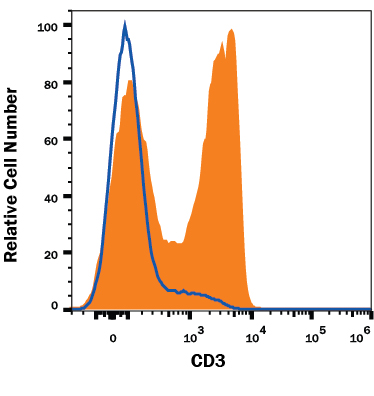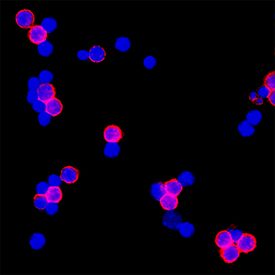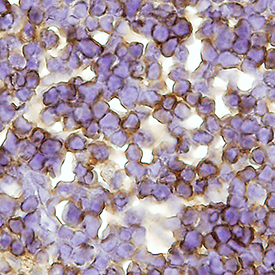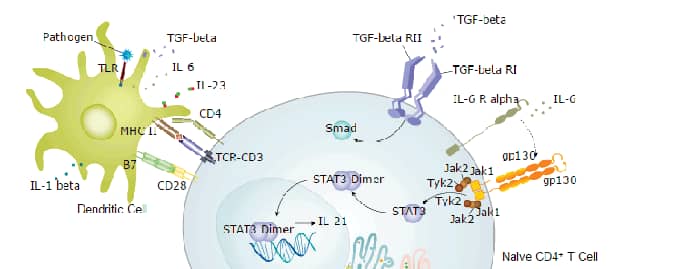Mouse CD3 Antibody Summary
Applications
Please Note: Optimal dilutions should be determined by each laboratory for each application. General Protocols are available in the Technical Information section on our website.
Scientific Data
 View Larger
View Larger
Detection of CD3 in Mouse Splenocytes by Flow Cytometry. Mouse splenocytes were stained with either Rat Anti-Mouse CD3 Monoclonal Antibody (Catalog # MAB8481R, filled histogram) or Rat IgG2B Isotype Control (Catalog # MAB006, open histogram) followed by PE-conjugated anti-Rat IgG Secondary Antibody (Catalog # F0105B). View our protocol for Staining Membrane-associated Proteins.
 View Larger
View Larger
CD3 in Mouse Splenocytes. CD3 was detected in immersion fixed mouse splenocytes using Rat Anti-Mouse CD3 Monoclonal Antibody (Catalog # MAB4841R) at 3 µg/mL for 3 hours at room temperature. Cells were stained using the NorthernLights™ 557-conjugated Anti-Mouse IgG Secondary Antibody (red; Catalog # NL007) and counterstained with DAPI (blue). Specific staining was localized to cell membrane. View our protocol for Fluorescent ICC Staining of Non-adherent Cells.
 View Larger
View Larger
CD3 in Mouse Spleen Tissue. CD3 was detected in immersion fixed paraffin-embedded sections of mouse spleen tissue using Rat Anti-Mouse CD3 Monoclonal Antibody (Catalog # MAB4841R) at 15 µg/mL for 1 hour at room temperature followed by incubation with the Anti-Rat IgG VisUCyte™ HRP Polymer Antibody (Catalog # VC005). Before incubation with the primary antibody, tissue was subjected to heat-induced epitope retrieval using Antigen Retrieval Reagent-Basic (Catalog # CTS013). Tissue was stained using DAB (brown) and counterstained with hematoxylin (blue). Specific staining was localized to cell membrane in lymphocytes. View our protocol for IHC Staining with VisUCyte HRP Polymer Detection Reagents.
Reconstitution Calculator
Preparation and Storage
- 12 months from date of receipt, -20 to -70 °C as supplied.
- 1 month, 2 to 8 °C under sterile conditions after reconstitution.
- 6 months, -20 to -70 °C under sterile conditions after reconstitution.
Background: CD3
Monoclonal 17A2 was generated by immunizing rats with a T-cell hybridoma (1). This antibody has been shown to react with the epsilon chain of the CD3 complex (1). The CD3 protein complex is expressed on thymocytes and mature T-cells and, therefore, is a useful reagent to monitor T-cell frequencies in tissues.
Product Datasheets
FAQs
No product specific FAQs exist for this product, however you may
View all Antibody FAQsReviews for Mouse CD3 Antibody
There are currently no reviews for this product. Be the first to review Mouse CD3 Antibody and earn rewards!
Have you used Mouse CD3 Antibody?
Submit a review and receive an Amazon gift card.
$25/€18/£15/$25CAN/¥75 Yuan/¥2500 Yen for a review with an image
$10/€7/£6/$10 CAD/¥70 Yuan/¥1110 Yen for a review without an image






